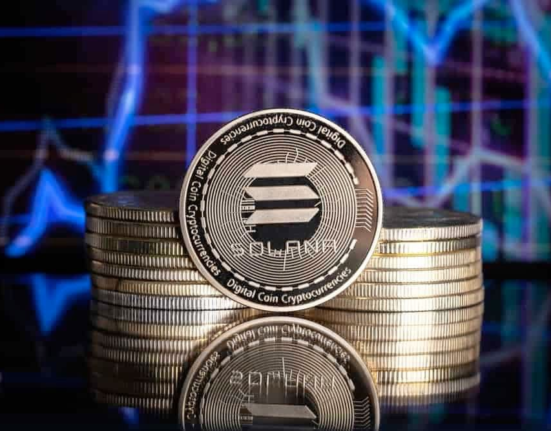A smart contract, like any contract, establishes the terms of an agreement. But unlike a traditional contract, a smart contract’s terms are executed as code running on a blockchain like Ethereum. Smart contracts allow developers to build apps that take advantage of blockchain security, reliability, and accessibility while offering sophisticated peer-to-peer functionality — everything from loans and insurance to logistics and gaming.
Just like any contract, smart contracts lay out the terms of an agreement or deal. What makes smart contracts “smart,” however, is that the terms are established and executed as code running on a blockchain, rather than on paper sitting on a lawyer’s desk. Smart contracts expand on the basic idea behind Bitcoin — sending and receiving money without a “trusted intermediary” like a bank in the middle — to make it possible to securely automate and decentralize virtually any kind of deal or transaction, no matter how complex. And because they run on a blockchain like Ethereum, they offer security, reliability, and borderless accessibility.
What Is a Smart Contract?
A smart contract is a self-executing program that automates the actions required in an agreement or contract. Once completed, the transactions are trackable and irreversible. The best way to envision a smart contract is to think of a vending machine—when you insert the correct amount of money and push an item’s button, the program (the smart contract) activates the machine to dispense your chosen item.
Smart contracts permit trusted transactions and agreements to be carried out among disparate, anonymous parties without the need for a central authority, legal system, or external enforcement mechanism.
While blockchain technology has come to be thought of primarily as the foundation for Bitcoin, it has evolved far beyond underpinning a virtual currency.
WHAT YOU NEED TO KNOW
- Smart contracts are scripts that automate the actions between two parties.
- Smart contracts do not contain legal language, terms, or agreements—only code that executes actions when specified conditions are met.
- Nick Szabo, an American computer scientist who conceptualized a virtual currency called “Bit Gold” in 1998,1 defined smart contracts as computerized transaction protocols that execute the terms of a contract.
Table of Contents
History of Smart Contracts
Smart contracts were first proposed in 1994 by Nick Szabo, an American computer scientist who conceptualized a virtual currency called “Bit Gold” in 1998, 10 years before Bitcoin was introduced. Szabo is often rumored to be the real Satoshi Nakamoto, the anonymous Bitcoin inventor, which he has denied.
Szabo defined smart contracts as computerized transaction protocols that execute the terms of a contract.2 He wanted to extend the functionality of electronic transaction methods, such as POS (points of sale), to the digital realm.
In his paper, Szabo also proposed the execution of a contract for synthetic assets, such as combining derivatives and bonds. Szabo wrote, “These new securities are formed by combining securities (such as bonds) and derivatives (options and futures) in a wide variety of ways. Very complex term structures for payments…can now be built into standardized contracts and traded with low transaction costs, due to computerized analysis of these complex term structures.”2
Smart contracts do not contain the legal language or even the terms of a contract between two parties. They are scripts that contain if/when/then statements, functions, module imports, and other programming that automate the actions between two parties.
Many of Szabo’s predictions in the paper came true in ways preceding blockchain technology. For example, derivatives trading is now mostly conducted through computer networks using complex term structures.
Read more What is Cryptocurrecy
Smart Contract Uses
Because smart contracts execute agreements, they can be used for many different purposes. One of the simplest uses is ensuring transactions between two parties occur, such as the purchase and delivery of goods. For example, a manufacturer needing raw materials can set up payments using smart contracts, and the supplier can set up shipments. Then, depending on the agreement between the two businesses, the funds could be transferred automatically to the supplier upon shipment or delivery.
Real estate transactions, stock and commodity trading, lending, corporate governance, supply chain, dispute resolution, and healthcare are only a few examples where smart contracts can be used.
Why are smart contracts important?
Smart contracts allow developers to build a wide variety of decentralized apps and tokens. They’re used in everything from new financial tools to logistics and game experiences, and they’re stored on a blockchain like any other crypto transaction. Once a smart-contract app has been added to the blockchain, it generally can’t be reversed or changed (although there are some exceptions).
Smart-contract-powered apps are often referred to as “decentralized applications” or “dapps” – and they include decentralized finance (or DeFi) tech that aims to transform the banking industry. DeFi apps allow cryptocurrency holders to engage in complex financial transactions — saving, loans, insurance — without a bank or other financial institution taking a cut and from anywhere in the world. Some of the more popular current smart-contract powered applications include:
- Uniswap: A decentralized exchange that allows users, via smart contract, to trade certain kinds of crypto without any central authority setting the exchange rates.
- Compound: A platform that uses smart contracts to let investors earn interest and borrowers to instantly get a loan without the need for a bank in the middle.
- USDC: A cryptocurrency that is pegged via smart contract to the US dollar, making one USDC worth one U.S. dollar. UDDC is part of a newer category of digital money known as stablecoins.
So how would you use these smart contract-powered tools? Imagine you’re holding some Ethereum that you’d like to trade for USDC. You could put some Ethereum into Uniswap, which, via smart contract, can automatically find you the best exchange rate, make the trade, and send you your USDC. You could then put some of your USDC into Compound to lend to others and receive an algorithmically determined rate of interest — all without using a bank or other financial institution.
In traditional finance, swapping currencies is expensive and time consuming. And it isn’t easy or secure for individuals to loan out their liquid assets to strangers on the other side of the world. But smart contracts make both of those scenarios, and a vast variety of others, possible.
How do smart contracts work?
Smart contracts were first proposed in the 1990s by a computer scientist and lawyer named Nick Szabo. Szabo famously compared a smart contract to a vending machine. Imagine a machine that sells cans of soda for a quarter. If you put a dollar into the machine and select a soda, the machine is hardwired to either produce your drink and 75 cents in change, or (if your choice is sold out) to prompt you to make another selection or get your dollar back. This is an example of a simple smart contract. Just like a soda machine can automate a sale without a human intermediary, smart contracts can automate virtually any kind of exchange.
Currently, Ethereum is the most popular smart contract platform, but many other cryptocurrency blockchains (including EOS, Neo, Tezos, Tron, Polkadot, and Algorand) can run them. A smart contract can be created and deployed to a blockchain by anyone. Their code is transparent and publicly verifiable, which means that any interested party can see exactly what logic a smart contract follows when it receives digital assets.
- Smart contracts are written in a variety of programming languages (including Solidity, Web Assembly, and Michelson). On the Ethereum network, each smart contract’s code is stored on the blockchain, allowing any interested party to inspect the contract’s code and current state to verify its functionality.
- Each computer on the network (or “node”) stores a copy of all existing smart contracts and their current state alongside the blockchain and transaction data.
- When a smart contract receives funds from a user, its code is executed by all nodes in the network in order to reach a consensus about the outcome and resulting flow of value. This is what allows smart contracts to securely run without any central authority, even when users are making complex financial transactions with unknown entities.
- To execute a smart contract on the Ethereum network, you will generally have to pay a fee called “gas” (so named because these fees keep the blockchain running).
- Once deployed onto a blockchain, smart contracts generally can’t be altered, even by their creator. (There are exceptions to this rule.) This helps ensure that they can’t be censored or shut down.
Smart Contract Pros and Cons
The primary benefit of smart contracts is similar to the benefit of blockchain technology—they remove the need for third parties. Other benefits of this technology are:
- Efficiency: They speed up contract execution
- Accuracy: There can be no human error introduced
- Immutability: The programming cannot be altered
Some of the downfalls of smart contracts are:
- Permanent: They cannot be changed if there are mistakes
- Human factor: They rely on the programmer to ensure the code is programmed properly to execute the intended actions
- Loopholes: There may be loopholes in the coding, allowing for contracts to be executed in bad faith
What Is an Example of a Smart Contract?
The simplest example of a smart contract is a transaction between a consumer and a business, where a sale is made. The smart contract executes the customer’s payment and the business’s shipment or transfer of ownership.
What Blockchain Has Smart Contracts?
Ethereum has smart contract capabilities inherent to its blockchain. The Bitcoin blockchain received smart contract abilities after its Taproot upgrade, which allowed it to communicate to layers that have smart contracts enabled on their blockchains.
What Are Smart Contracts in Simple Terms?
Smart contracts are apps on a blockchain that make each side of a transaction complete its part. For example, a smart contract could initiate a fund transfer with a third party when the transferor signed an agreement.
The Bottom Line
Smart contracts are code written into a blockchain that executes the actions two parties agree to outside the chain. By automating these actions, the need for an intermediary or trust between the parties is removed.
Disclaimer||
The Information provided on this website article does not constitute investment advice,financial advice,trading advice,or any other sort of advice and you should not treat any of the website’s content as such.
Always do your own research! DYOR NFA
Coin Data Cap does not recommend that any cryptocurrency should be bought, sold or held by you, Do Conduct your own due diligence and consult your financial adviser before making any investment decisions!





Leave feedback about this